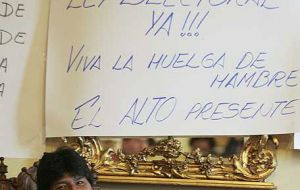MercoPress. South Atlantic News Agency
Bolivian president on hunger strike to force Congress
 Pte. Evo Morales during his hunger strike
Pte. Evo Morales during his hunger strike Bolivian President Evo Morales went on a hunger strike Thursday to demand Congress pass an electoral law which includes a firm date for December’s general election and other reforms which could make it easier for him to get re-elected and win control of Congress.
Bolivia's opposition-led Senate has failed to approve a law to handle the elections, which are mandated by a Morales-backed constitutional reform approved by voters in January. Morales, who took office in 2006 has suggested opposition leaders are trying to block the planned December elections with delaying tactics.
Tensions flared last week when members of the ruling Movement Toward Socialism, MAS, party clashed with the opposition over articles of the bill, which could help Morales by assigning more seats to poorer, rural areas. The ruling coalition controls the Lower House but the opposition can block legislation in the Senate.
”Faced with the negligence of a bunch of neo-liberal lawmakers, we have no choice but to take this step (hunger strike) ... they don't want to pass a law that guarantees the implementation of the constitution” Mr Morales told reporters at the presidential palace in La Paz.
The new constitution designed to give more power and rights to the country's indigenous majority was approved by more than 60% of voters in late January. The constitution calls for Congress to approve an electoral law ratifying December 6th as the date for a general election.
The opposition has rejected the bill because it gives 14 seats to minority indigenous groups which, they say, amounts to handing them to Mr Morales, who is Bolivia’s first elected indigenous president.
The opposition also wants a new electoral register ahead of the election, saying the current census is not reliable. Bolivia's National Electoral Court has said it would take at least nine months to create a new register, which would imply the deferral of December's vote.




Top Comments
Disclaimer & comment rulesCommenting for this story is now closed.
If you have a Facebook account, become a fan and comment on our Facebook Page!